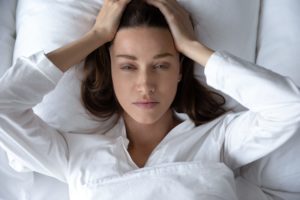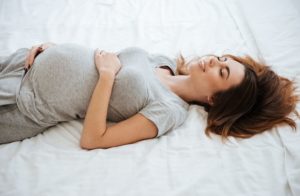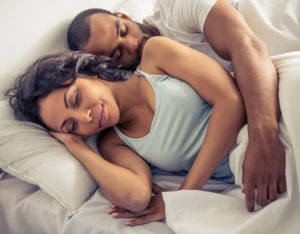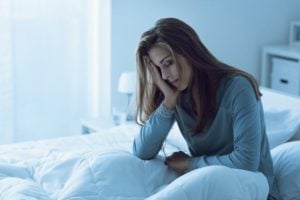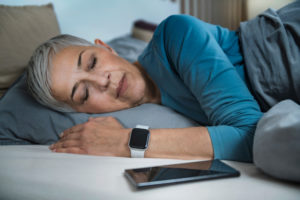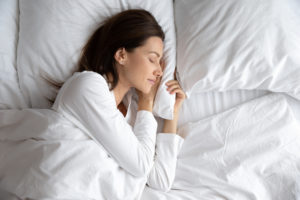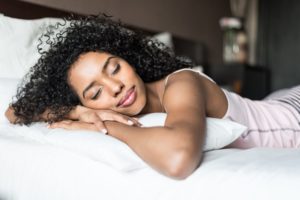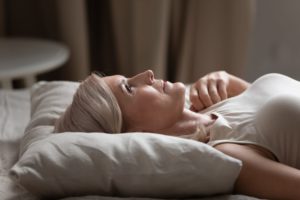Healthy Sleep Tips For Women of All Ages
If you’re a woman, practicing healthy sleep habits may be especially important for you. Generally, women need more sleep than men do. Women also often have more trouble getting the sleep they need.
Women are about 40% more likely to experience insomnia compared to men. Even women who don’t have insomnia may struggle to fall or stay asleep and may feel more tired throughout the day. Practicing healthy sleep habits can help women get the sleep they need to be healthy and stay alert during the day.
Create a Calm and Quiet Sleep Environment
Studies have found that women are more sensitive to noise during sleep. If you find yourself waking up during the night, consider that sounds may be a culprit. Wearing earplugs can block out potentially disruptive noise. Keeping a white noise machine in the bedroom may also help, as its sound can be soothing and muffle noises that may arise at night.

Find Your Perfect Sleeping Temperature
While cool nighttime temperatures help most people sleep, they may be particularly useful for women in times of hormonal shifts, including the week before and during menstruation, pregnancy, and menopause.
Women are more likely to experience hot flashes during sleep, called night sweats, during menopause or perimenopause, which are the years leading up to menopause. Night sweats can disrupt sleep, but keeping bedroom temperatures cool may help.
Keeping the bedroom cool may help you sleep better. Wearing lightweight pajamas can also contribute to staying cool and comfortable during sleep.

Take Extra Care During Hormonal Shifts
Hormonal shifts can trigger sleep issues for women for many reasons beyond changes in body temperature. Being extra careful to practice healthy sleep habits during these times may help. Going to sleep and waking up at the same time every day, trying relaxation techniques like meditation and deep breathing, wearing an eye mask to sleep, and avoiding late afternoon naps can promote improved sleep.
Hot flashes only account for about 27% of nighttime awakenings in women entering menopause. Also, over 65% of pregnant people struggle with sleep at some point during pregnancy for reasons other than hot flashes, such as nausea, pain, acid reflux, and a need to urinate. Hormonal changes may also lead to sleep disruptions the week before menstruation in people with premenstrual syndrome (PMS) or premenstrual dysphoric disorder (PMDD).
Exercise Regularly
Regular exercise can promote sleep in people of all genders. Research on women in particular has found that those who are more sedentary tend to experience more insomnia, and those who are more active tend to sleep better.High-intensity aerobic exercise may improve women’s sleep more than low-intensity exercise.
Although exercise often helps with sleep, it’s best not to exercise in the late afternoon or evening. Also, those in menopause may want to pay close attention to how their body reacts to exercise. Some experts think that some menopausal women who have hot flashes might not have their symptoms relieved by exercise, since it can increase body temperature.
Avoid Consuming Sleep Disruptors
Many people might not realize that substances they consume regularly could interfere with their sleep. Caffeine, alcohol, and nicotine can all negatively impact sleep. Avoiding these substances in the hours before bedtime may promote better sleep, including in women experiencing the hot flashes of menopause.
Consider Your Partner’s Sleep Behaviors
Sometimes women experience disrupted sleep due to their bed partner’s snoring or other sleep behaviors. Men are more likely to have obstructive sleep apnea than women. Symptoms of obstructive sleep apnea include sounds like snoring, gasping, and choking, which may wake up a bed partner or prevent them from getting sleep.
For these reasons, women may find their sleep is disturbed if the partner has undiagnosed sleep apnea. When one sleep partner has sleep apnea, their symptoms may disrupt the other’s sleep and cause them to feel tired during the day. A bed partner’s noises may especially disturb a woman sleeping, since women are more sensitive to sounds during sleep. Diagnosing and treating a bed partner with obstructive sleep apnea may improve a woman’s sleep in this case.
Adjust Caregiving Roles to Protect Sleep Time
Years of research demonstrate that women are more likely than men to have their sleep negatively impacted because they are caring for others, whether children or ill household members. Often, these caregiving roles create a disproportionate division of household labor and cognitive and emotional stress that can interfere with sleep or shorten sleep opportunities.
Shifting some of the caregiving responsibility to male partners so the work and emotional load is more equitable could ostensibly help protect women’s sleep time. Setting boundaries around women’s sleep to avoid disruptions may be especially important, because women generally need more sleep than men do, take longer to fall asleep, and wake up more times during the night, especially in reaction to noise.
Still Can’t Sleep? Talk With a Medical Professional
If you’re practicing healthy sleep habits, but still struggle to sleep soundly, consider seeing a doctor. Women face a greater risk of disorders linked to sleep troubles, including depression, anxiety, fibromyalgia, and restless legs syndrome. Treating these disorders may in turn improve sleep.
Women with obstructive sleep apnea may present symptoms differently from men and, as a result, their doctors may be less likely to screen them for the disorder. Although women aren’t as likely as men to experience obstructive sleep apnea throughout much of life, their risk for the disorder becomes equal in menopause. If you’re in menopause and struggling to sleep despite practicing healthy sleep habits, you might want to consider asking your doctor about obstructive sleep apnea or other possible sleep disorders.

Still have questions? Ask our community!
Join our Sleep Care Community — a trusted hub of sleep health professionals, product specialists, and people just like you. Whether you need expert sleep advice for your insomnia or you’re searching for the perfect mattress, we’ve got you covered. Get personalized guidance from the experts who know sleep best.
References
8 Sources
-
Mehta, N., Shafi, F., & Bhat, A. (2015). Unique Aspects of Sleep in Women. Missouri medicine, 112(6), 430–434.
https://pubmed.ncbi.nlm.nih.gov/26821442/ -
Loprinzi, C. & Casper, R. (2024, March). Menopausal hot flashes. In R. Barbieri, W. Crowley, & K. Martin (Ed.). UpToDate.
https://www.uptodate.com/contents/menopausal-hot-flashes -
Winkelman, J. (2024, March). Overview of the treatment of insomnia in adults. In R. Benca & A. Eichler (Ed.). UpToDate.
https://www.uptodate.com/contents/overview-of-the-treatment-of-insomnia-in-adults -
Jehan, S., Auguste, E., Hussain, M., Pandi-Perumal, S. R., Brzezinski, A., Gupta, R., Attarian, H., Jean-Louis, G., & McFarlane, S. I. (2016). Sleep and Premenstrual Syndrome. Journal of sleep medicine and disorders, 3(5), 1061.
https://pubmed.ncbi.nlm.nih.gov/28239684/ -
Dabrowska-Galas, M., & Dabrowska, J. (2021). Physical activity improves sleep quality in women. Ginekologia polska, 92(7), 487–490.
https://pubmed.ncbi.nlm.nih.gov/33844249/ -
Ezati, M., Keshavarz, M., Barandouzi, Z. A., & Montazeri, A. (2020). The effect of regular aerobic exercise on sleep quality and fatigue among female student dormitory residents. BMC sports science, medicine & rehabilitation, 12, 44.
https://pubmed.ncbi.nlm.nih.gov/32774864/ -
Kline, L. (March 2024). Clinical presentation and diagnosis of obstructive sleep apnea in adults. In N. Collop & G. Finlay (Ed.). UpToDate.
https://www.uptodate.com/contents/clinical-presentation-and-diagnosis-of-obstructive-sleep-apnea-in-adults -
Lin, C. M., Davidson, T. M., & Ancoli-Israel, S. (2008). Gender differences in obstructive sleep apnea and treatment implications. Sleep Medicine Reviews, 12(6), 481–496.
https://pubmed.ncbi.nlm.nih.gov/18951050/


